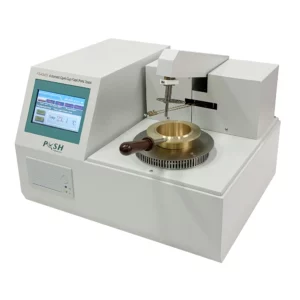Temperature can significantly affect the results obtained from a Karl Fischer titrator, as the reaction between water and the Karl Fischer reagent is temperature-dependent. The rate of the titration reaction increases with temperature, and this can impact the accuracy of moisture measurements. To address temperature effects and ensure accurate results, temperature compensation is employed in Karl Fischer titration.
Here’s how temperature affects the results and how compensation is managed:
Effects of Temperature on Karl Fischer Titrations:
- Reaction Kinetics:
- The Karl Fischer titration involves the reaction between water in the sample and the Karl Fischer reagent. The rate of this reaction increases with temperature. Higher temperatures lead to faster titration reactions, while lower temperatures result in slower reactions.
- Sensitivity to Temperature Changes:
- The sensitivity of the Karl Fischer titration to temperature changes can result in variations in titration endpoints and, consequently, inaccuracies in moisture content measurements.
- Vapor Pressure of Water:
- Temperature affects the vapor pressure of water in the sample. As temperature increases, the vapor pressure of water also increases,flash fire point tester potentially influencing the release of water vapor during the titration process.
Temperature Compensation in Karl Fischer Titrators:
- Equation of State Compensation:
- Some Karl Fischer titrators use an equation of state compensation method. This approach involves measuring the temperature and applying a correction factor to the titration results based on the known temperature dependence of the reaction rate.
- Dynamic Compensation:
- Dynamic compensation involves continuously monitoring the temperature during the titration process and adjusting the titration rate in real-time. This ensures that the titration reaction proceeds at a consistent rate, irrespective of temperature fluctuations.
- Temperature Probe:
- Karl Fischer titrators are equipped with temperature probes that monitor the temperature of the sample or reagent. The temperature data is used to calculate a temperature correction factor that adjusts the titration results.
- Temperature-Controlled Chambers:
- Some advanced Karl Fischer titrators may feature temperature-controlled chambers or environments to maintain a constant temperature during the titration. This helps minimize the impact of external temperature variations.
- Pre-Titration Conditioning:
- Pre-titration conditioning involves allowing the sample and reagents to equilibrate to a specific temperature before the titration begins. This reduces the impact of temperature variations during the titration process.
- Calibration with Standard Solutions:
- Regular calibration of the Karl Fischer titrator with standard solutions at different temperatures is essential. This calibration process helps establish the relationship between temperature and titration results.
- Corrective Algorithms:
- Titrators may incorporate corrective algorithms that consider the temperature dependence of the reaction kinetics. These algorithms adjust the titration results based on the measured temperature.
- Validation Protocols:
- Validation protocols may be implemented to ensure that the temperature compensation mechanisms are functioning correctly. This involves periodic checks and calibration to maintain the accuracy of the titration system.
By implementing these temperature compensation methods, Karl Fischer titrators can provide accurate and reliable moisture content measurements, even in the presence of temperature variations. It’s crucial to follow proper calibration and validation procedures to ensure the effectiveness of temperature compensation mechanisms.
